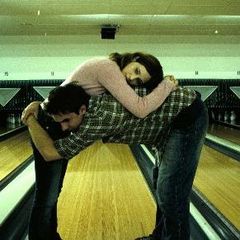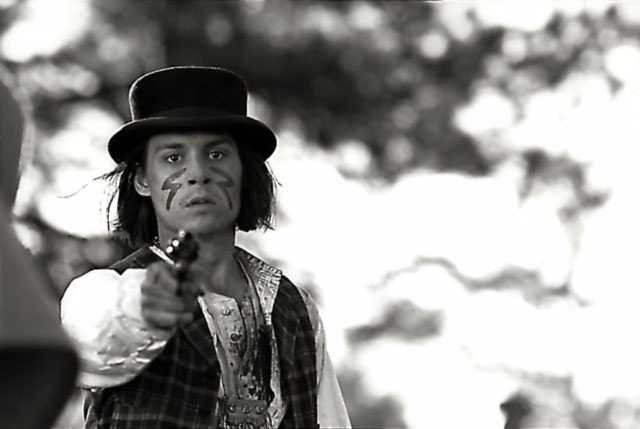 3:10 to Yuma
3:10 to Yuma is a new western, but it wears the marks of its tried and true forefathers of the genre proudly. You don't have to like westerns to like
3:10 to Yuma, but it will help. There are bad guys in black, stagecoach robberies, ruthless outlaw gangs, downtrodden ranchers, and sons aging much too fast on the hard, dry earth around them.
That is just some of the good news for you western fans (I'm sure at least a few exist on this campus). Certainly it is not bad news for those of you who could not care less about men in cowboy hats trotting about on horses and talking about the men they have killed. If you do not care, it rolls right off your back. What might stick is the psychological game of wits and will between the two main characters played by two of the best actors working today.
Russell Crowe plays Ben Wade, the aforementioned bad guy in black. Christian Bale plays Dan Evans, the aforementioned downtrodden rancher.
Wade is captured dallying about with a saloon gal in town after a stagecoach robbery. One of the men charged with the task of taking him to justice (via the 3:10 train to the prison in Yuma referred to in the title) turns out to be Evans. He is promised a sum of cash in return that could keep his struggling family above the financial waters it is drowning in.
Evans has two boys. The youngest looks at his father with worshipping eyes. The older boy, played by Logan Lerman, has not looked at him in that way for a long time. He does not respect his father, a civil war veteran with a bum leg who has not shown strength and fortitude in the eyes of his wife and oldest child during their recent struggles.
This is the basis of Evan's situation: he has something to prove to himself and his family. Therefore, when he is granted the opportunity to make things right, he takes it.
That means having to listen to the manipulative, suave, and dangerous Wade along the way to the train several days journey away. This allows the writers, director, and actors the opportunity to create the real entertainment. Sure,
3:10 to Yuma is a western, so there are gunfights and explosions. However, it is the interactions of these two men that kept me interested.
Wade keeps pushing Evan's buttons. Unlike the pushover Evans appears to be at the beginning, he begins to push back, meet gazes, make threats, and stand firm although it seems that inside all he wants to do is wobble freely.
Like many interesting villains, Wade is alluring. He draws you in with his charm, mean streak, and wit. What the film does well is establish a comfort with the character only to take away that comfort at will. Just when you start to think he is not all that bad, he strikes. He is kind of like a tiger in a magic show.
The film moves slowly at times, but this is because the film only carries the illusion of a "
bang bang" western. Its true heart lies in these two characters on their journey not only to the train but also revelation.
Yuma ends in a shootout, but it is the actors rather than the action that do the heavy lifting. There is so much revealed about the characters within the last half hour that it might be too much.
I was not sure I liked the ending. I rolled it over in my head for a good hour after the credits rolled and I slowly began to see that the film had earned what had first seem forced. The filmmakers offer precedents along the way to the train that explain why the film can end in the way it does with its characters making the choices they do. I am not completely on board with the final result, but I can clearly see what the filmmakers intended me to.
I would be foolish not to mention the work of Ben Foster as Wade's right-hand man in the gang. It is a role ripe with bravado, and Foster takes full advantage of the opportunities given to him to shine. It is a performance I will remember that surely will get looked over by audiences because the two leads do such fine jobs.
These are neither Bale's nor Crowe's best performances, but each delivers solid, commendable work in what could have been a western too old fashioned to allow these wonderful modern actors to shine.
Not everyone shines, however. I have not really been a fan of Peter Fonda in the past, and his work in
Yuma does not make me change my mind. I did not believe a word he said. His performance is too weak to hide the fact that it is Peter Fonda
the actor pretending to be a tough SOB.
Another weakness is a completely unnecessary cameo from a famous face. He tries to hide behind a beard, but it is useless. His appearance took me out of the reality of the movie. It comes about halfway through. I committed to the reality of the movie. "These are cowboys. They are heading to a train. Good. I've got it." Then what's-his-face shows up and I said, "Wait...is that who I think it is? It might be. It is!" Then I am out. I am back in the world of celebrity rather than the world of pistols, spurs, and horses I am supposed to be in.
***1/2





